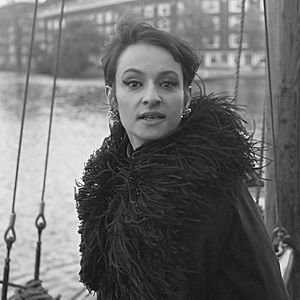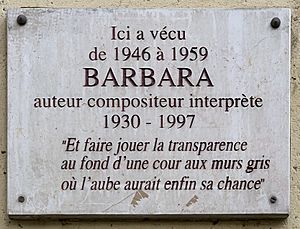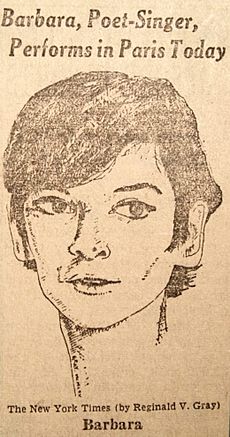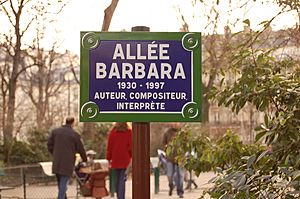Barbara (singer) facts for kids
Quick facts for kids
Barbara
|
|
|---|---|

Barbara in Amsterdam in 1965
|
|
| Background information | |
| Birth name | Monique Andrée Serf |
| Born | 9 June 1930 Paris, France |
| Died | 24 November 1997 (aged 67) Neuilly-sur-Seine, France |
| Genres | Chanson, French pop |
| Occupation(s) | Singer-songwriter and actress |
| Instruments | Piano |
| Years active | 1958–1996 |
| Labels | Universal Music Group |
Monique Andrée Serf (born June 9, 1930 – died November 24, 1997), known simply as Barbara, was a famous French singer and songwriter. She chose her stage name, Barbara, from her grandmother, Varvara Brodsky.
Barbara started her career in the late 1950s in Paris. She was known for singing in small, cozy clubs called cabarets. People even called her La Chanteuse de minuit, which means 'the midnight singer'. Later, she began writing her own songs, which made her very famous. Some of her most well-known songs are "Dis, quand reviendras-tu ?" (1962), "Ma plus belle histoire d'amour" (1966), and "L'Aigle noir" (1970). "L'Aigle noir" was incredibly popular, selling over a million copies in just twelve hours!
Barbara was buried in the Cimetière parisien de Bagneux in Paris. A Paris Métro station, named Barbara in her honor, opened nearby on January 13, 2022.
Contents
Early Life and Challenges
Barbara was born in Paris, France. Her family lived in different places as she grew up, including Roanne and Tarbes. When she was 13 years old, during World War II, she had to hide because Germany had taken over France. Her family was kept safe by another family from 1943 to 1945.
After the war, Barbara's family returned to Paris in 1946. Her dream was to become a pianist, but a problem with her hand made this difficult. To cheer her up, her parents let her take singing lessons. A music teacher in her neighborhood noticed her talent and helped her. She took vocal lessons and learned to play the piano a little. In 1947, she even enrolled in a music school. However, money was tight, and she had to stop her studies in 1948.
She first performed at the Théâtre Mogador and then in Belgium, where she used the stage name Barbara Brodi. In 1951, she tried out for a popular cabaret in Paris but didn't get a permanent spot. She went back to Brussels. In 1955, she returned to Paris and had more success, singing in various cabarets and gaining more fans.
The war and her family's struggles deeply affected her. These feelings sometimes appeared in her songs, like "Mon Enfance."
Becoming a Musician
Barbara was a tall person and often wore black when she sang sad songs about lost love. From 1950 to 1951, she lived in Brussels and became part of a lively group of artists. She also visited Charleroi, where she made many artist friends. Her friends, who were painters and writers, turned an old house into art studios and a concert hall. There, Barbara performed songs by famous singers like Édith Piaf. She worked hard to make a living as her career slowly grew.
When she returned to Paris, she met Jacques Brel and they became lifelong friends. She sang many of his songs. Later, she met Georges Brassens, and she began to include his songs in her performances and on her first album. In the 1950s, she sang in smaller clubs and started to build a fan base, especially among students in the Latin Quarter.
In 1957, she went back to Brussels to record her first single. But her big break came in 1961 when she sang at the Bobino Music-Hall in Montparnasse. She gave a memorable performance, but some critics thought her style was a bit formal. She kept performing in small clubs. Two years later, at the Théâtre des Capucines, she found success with both the audience and critics by singing new songs she had written herself. From then on, her career took off, and she signed a major recording contract with Philips Records in 1964.
Musical Style and Famous Songs
Barbara was first inspired by songwriters Mireille and Pierre MacOrlan. But she soon developed her own unique style. Writing her own songs changed her into a special singer-songwriter. In the 1960s, she wrote her famous song, "Ma plus belle histoire d'amour c'est vous" ("My Most Beautiful Love Story Is You"). She also wrote other well-known songs like "L'aigle noir", "Nantes", "La solitude", "Göttingen" and "Une petite cantate."
These five songs, plus "Dis, quand reviendras-tu?", were translated into German by a Belgian-German singer. The song "Göttingen," named after a German city, is said to have helped bring Germany and France closer after the war.
Middle Years and Awards
Barbara returned to Bobino in 1964 for many sold-out shows. She performed at the Paris Olympia and other important places in France, becoming one of the country's most loved stars. In 1964, she released the album Barbara chante Barbara. It was a big success and won the Grand Prix du Disque award in 1965. At the award ceremony, Barbara tore her award into pieces and gave a piece to each of her sound technicians to show her thanks.
Acting Career
In 1969, a song she sang, "Moi, je me balance," was used as the theme for the film La fiancée du pirate. Barbara decided to limit her concert singing. In 1970, she started acting in a play called Madame, but it wasn't very successful. In 1971, she acted with Jacques Brel in a movie he directed called Franz. Two years later, she starred in L'Oiseau rare. Her last movie role was in 1975 in Je suis né à Venise.
Later Years and Passing
In the 1970s, Barbara appeared on TV shows with stars like Johnny Hallyday. She also toured in Japan, Canada, Belgium, Israel, the Netherlands, and Switzerland. Throughout the 1980s, she continued to tour and write songs. Her album Seule was one of France's top-selling albums in 1981. The next year, she received another Grand Prix du Disque award for her contributions to French culture.
She worked closely with the famous actor Gérard Depardieu and his wife. They collaborated on songs for movies and records. In 1986, she performed at the Metropolitan Opera in New York City with Mikhail Baryshnikov in a ballet show. She also helped write the music for the play Lily Passion, where she acted with Depardieu.
In the late 1980s, Barbara became active in the fight against AIDS. In 1988, the French government gave her the Legion of Honour, a very important award. Health problems made it harder for her to perform, so she started writing her life story. She recorded another successful album in 1996, which sold over a million copies in twelve hours. Barbara passed away from breathing problems in Neuilly-sur-Seine, a suburb of Paris, on November 24, 1997. She was buried in the family grave at the Cimetière de Bagneux in southwest Paris.
Personal Life
In October 1953, Barbara married Claude John Luc Sluys, a law student from Belgium, but they separated in 1956. She wrote many very personal songs. For example, "Nantes" was about her father, and "Une petite cantate" was dedicated to her friend Liliane Bénelli, who died in a car accident in 1965. Later in her life, she wrote a song for her fans called "Ma plus belle histoire d'amour" and another about her musicians called "Mes hommes."
Musical Legacy
Barbara's music has influenced many singers, both French-speaking and others. A style called "Nouvelle Chanson" (New Chanson) includes artists like Keren Ann and Benjamin Biolay, who are often seen as following her updated style.
The Anglo-French writer David Bret, a close friend of Barbara, wrote a song about AIDS prejudice called "Les Hommes Bafoués" at her request. Bret also translated three of her songs into English for her: "Ma Plus Belle Histoire D'Amour," "La Solitude," and "Précy Jardin." These were recorded in 1992 but have not been released yet. In 1971, the Spanish singer Maria del Mar Bonet recorded a version of "L'Aigle Noir" in Catalan, which was very popular in Spanish-speaking countries. "L'Aigle Noir" has also been adapted and sung in Spanish, Swedish, and many times in Japanese, also with great success.
Today, artists like Martha Wainwright from New York, Spanish singer-songwriter Conchita Mendivil (who both recently sang "Dis, Quand Reviendras-tu?"), Regina Spektor (with "Après Moi"), and London-based singer-songwriter Ana Silvera have all performed songs originally sung by Barbara.
Albums
- 1959: Barbara à l'Écluse
- 1960: Barbara chante Brassens
- 1961: Barbara chante Jacques Brel
- 1964: Dis, quand reviendras-tu?
- 1964: Barbara chante Barbara
- 1965: Barbara (N°2)
- 1967: Barbara Singt Barbara
- 1967: Barbara (Ma plus belle histoire d'amour)
- 1967: Bobino 1967
- 1968: Le Soleil noir
- 1969: Une soirée avec Barbara
- 1970: Madame
- 1970: L'aigle noir
- 1972: La fleur d'amour
- 1973: La Louve
- 1974: Enregistrement public au Théâtre Des Variétés
- 1978: Enregistrement public à L'Olympia (Les insomnies)
- 1981: Seule
- 1981: Récital "Pantin 81"
- 1986: Lily Passion (with Gérard Depardieu)
- 1987: Châtelet 87
- 1994: Châtelet 93
- 1996: Barbara
Singles
- "L'Aigle noir"
- "Göttingen"
- "Mon enfance"
Filmography
- 1955: Le Toubib, médecin du gang
- 1971: Franz
- 1973: L'Oiseau rare as singer Alexandra Blitz-Balfour
- 1975: Je suis né à Venise by Maurice Béjart
Sources
- Adapted from the article Monique Serf, from Wikinfo, licensed under the GNU Free Documentation License.
See also
 In Spanish: Barbara para niños
In Spanish: Barbara para niños
 | Misty Copeland |
 | Raven Wilkinson |
 | Debra Austin |
 | Aesha Ash |




